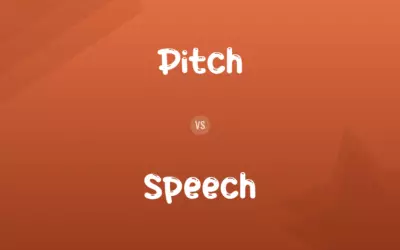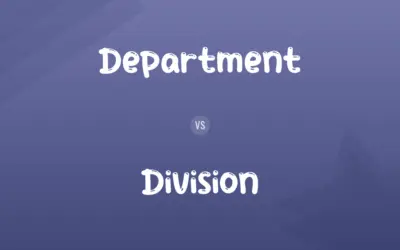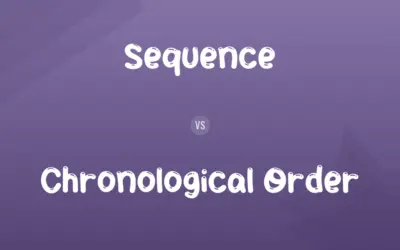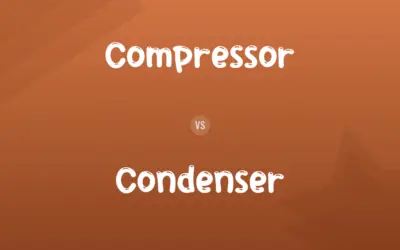Cognisant vs. Cognizant: Difference and Comparison
Edited by Muazma Batool — By Muneeza Rehman — Updated on February 29, 2024
Cognisant and cognizant both refer to being aware or having knowledge of something, with "cognizant" being the preferred spelling in American English.
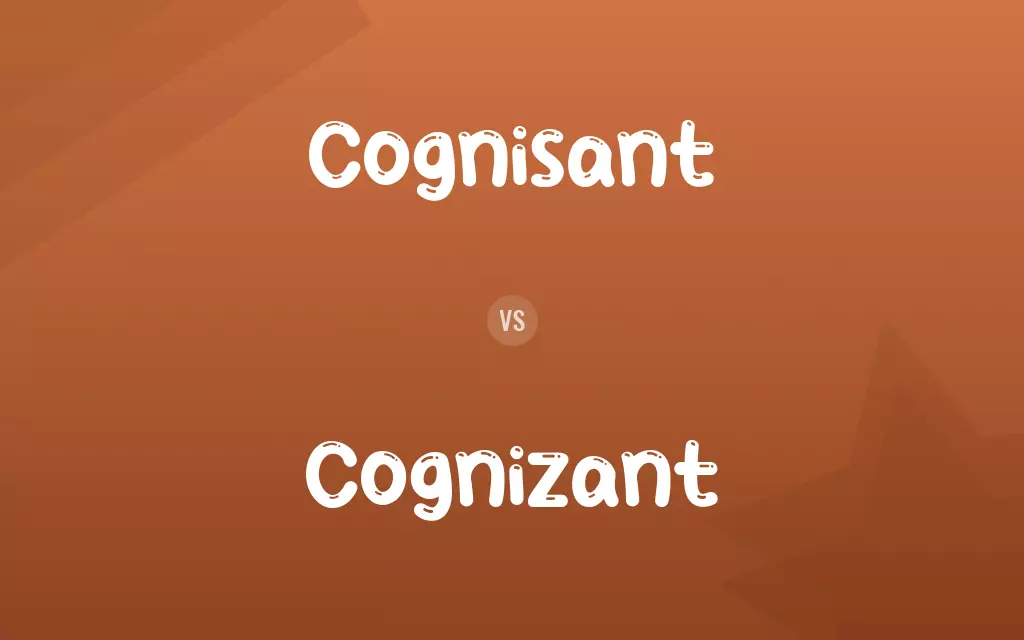
Difference Between Cognisant and Cognizant
Both "cognisant" and "cognizant" describe the state of being aware or having knowledge of something, reflecting no difference in meaning. The distinction lies primarily in spelling preference, influenced by regional English norms.
Muneeza Rehman
Feb 29, 2024
"Cognizant" is predominantly used and recognized in American English, "cognisant" finds its preference in British English. This regional preference affects not just spelling but also the perception of correctness in written communication.
Muneeza Rehman
Feb 29, 2024
In academic and professional contexts, the choice between "cognisant" and "cognizant" might hinge on the expected norms of the audience or publication standards, emphasizing the importance of aligning with regional spelling conventions.
Muneeza Rehman
Feb 29, 2024
The evolution of English has led to such variations in spelling across different versions of the language, with "cognizant" and "cognisant" serving as examples of how words can be adapted while retaining their original meanings.
Jonathan
Feb 29, 2024
Despite the spelling difference, the pronunciation of "cognisant" and "cognizant" remains largely the same, underlining the fact that the variance is more about orthography than phonetics, making the choice largely a matter of stylistic preference.
Kaitlyn
Feb 29, 2024
Cognisant vs. Cognizant Comparison Chart
Cognisant vs. Cognizant Definitions
◉Cognisant
Informed about something.
They were fully cognisant of the legal implications.
Elijah
Feb 29, 2024
◉Cognisant
Having knowledge or being conscious of.
He remained cognisant of the time constraints.
William
Feb 29, 2024
◉Cognizant
Recognizing the importance of.
He's cognizant of the need for environmental protection.
Lucas
Feb 29, 2024
◉Cognisant
Recognizing the importance of.
She is cognisant of the need for change.
Muneeza Rehman
Feb 29, 2024
◉Cognizant
Having knowledge or being conscious of.
She is cognizant of the differences between the two proposals.
Olivia
Feb 29, 2024
◉Cognisant
Aware of something.
She was cognisant of the potential risks involved.
Muneeza Rehman
Feb 29, 2024
◉Cognizant
Informed about something.
They are cognizant of the company's financial status.
Levi
Feb 29, 2024
◉Cognisant
Being mindful or observant.
The team was cognisant of the project deadlines.
Muneeza Rehman
Feb 29, 2024
◉Cognizant
; fully informed; having understanding of a fact.
The defendant is cognizant that this is a serious charge.
Muneeza Rehman
May 03, 2023
◉Cognisant
(usually followed by `of') having knowledge or understanding;
our youth are cognizant of the law
I am well aware of his limitations
Muneeza Rehman
May 03, 2023
◉Cognizant
(usually followed by `of') having knowledge or understanding;
our youth are cognizant of the law
I am well aware of his limitations
Muneeza Rehman
May 03, 2023
◉Cognizant
Being mindful or observant.
The management is cognizant of the employees' contributions.
William
Feb 29, 2024
Cognisant vs. Cognizant Frequently Asked Questions
What does cognizant mean?
Cognizant also means being aware or having knowledge of something, identical in meaning to cognisant.
Muneeza Rehman
Feb 29, 2024
Why are there two spellings for cognizant/cognisant?
The two spellings reflect regional variations in English, with "cognizant" preferred in American English and "cognisant" in British English.
Olivia
Feb 29, 2024
Can I use cognizant in British English?
While "cognizant" is understood in British English, "cognisant" is the preferred spelling.
Nolan
Feb 29, 2024
Is cognisant used in American English?
"Cognisant" may be used but "cognizant" is the standard spelling in American English.
Kaitlyn
Feb 29, 2024
How can I remember which spelling to use?
Remember the regional preference: "z" for American English and "s" for British English.
Jonathan
Feb 29, 2024
What does cognisant mean?
Cognisant means being aware or having knowledge of something.
Muneeza Rehman
Feb 29, 2024
Is there a difference in meaning between cognisant and cognizant?
No, there is no difference in meaning; the difference lies only in spelling.
Muneeza Rehman
Feb 29, 2024
Does the pronunciation of cognisant and cognizant differ?
Pronunciation is largely the same, though regional accents may cause slight variations.
Lucas
Feb 29, 2024
In which English-speaking countries is "cognisant" preferred?
"Cognisant" is preferred in the UK and other Commonwealth countries.
Muneeza Rehman
Feb 29, 2024
Are there any rules for when to use cognizant vs. cognisant?
The main rule is to consider the audience and the regional spelling norms.
Muneeza Rehman
Feb 29, 2024
How should I spell cognizant/cognisant in academic writing?
Choose the spelling based on the regional norms of the publication or institution for which you are writing.
Muneeza Rehman
Feb 29, 2024
Does using one spelling over the other affect the clarity of communication?
No, the choice of spelling does not affect the clarity since the meaning remains the same.
Henry
Feb 29, 2024
Are there any other examples of British vs. American spelling differences like cognizant/cognisant?
Yes, examples include "color" (US) vs. "colour" (UK) and "realize" (US) vs. "realise" (UK).
Muneeza Rehman
Feb 29, 2024
Can the choice of spelling impact the perception of a writer's proficiency?
Yes, using the appropriate regional spelling can reflect a writer's attention to linguistic details and audience expectations.
Muneeza Rehman
Feb 29, 2024
Is "cognizant" considered incorrect in British English?
Not incorrect, but "cognisant" is the conventional spelling in British English contexts.
Kaitlyn
Feb 29, 2024
Content Creators
Written by
Muneeza RehmanAt Comparisons.wiki, Muneeza skillfully navigates the vast sea of information, ensuring clarity and accuracy as the lead content editor. With a keen eye for detail, she curates every comparison to enlighten and engage readers.
Edited by
Muazma BatoolAs a content editor, Muazma Batool is not just a grammar guru but a creative mastermind who breathes life into every word. With an eagle eye for detail and a passion for storytelling, she transforms bland text into engaging content that captivates audiences and drives results.


